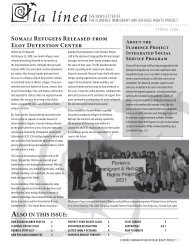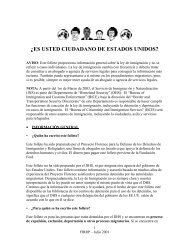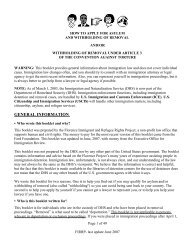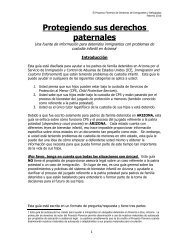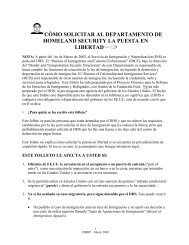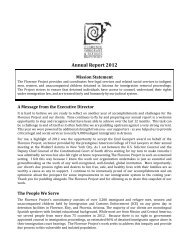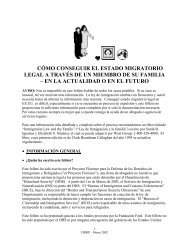quick reference chart and annotations for determining immigration ...
quick reference chart and annotations for determining immigration ...
quick reference chart and annotations for determining immigration ...
You also want an ePaper? Increase the reach of your titles
YUMPU automatically turns print PDFs into web optimized ePapers that Google loves.
Immigrant Legal Resource Center, Florence Immigrant <strong>and</strong> Refugee Rights Project,<br />
Maricopa County Public Defender August 2012<br />
(9th Cir. 2004). However, the Ninth Circuit is likely to reconsider this holding, because it was based on<br />
the court’s general rule not to consider the effect of recidivist sentence enhancements, a rule that was<br />
overturned in United States v. Rodriguez, 128 S.Ct. 1783 (2008); see also comments in Lopez v.<br />
Gonzales, 127 S. Ct. 625, n. 3 (2006). Note also that a single conviction of possession of flunitrazepam is<br />
an aggravated felony, even if there is no prior drug conviction; see discussion of ARS § 13-3407/3408.<br />
Whenever possible, criminal defense counsel should plead to “use” or leave the record vague<br />
between possession <strong>and</strong> use. Criminal defense counsel should reduce a possession conviction to a<br />
misdemeanor wherever possible. This is because a felony may be treated as an aggravated felony in<br />
<strong>immigration</strong> proceedings outside the Ninth Circuit, <strong>and</strong> in federal criminal prosecutions <strong>for</strong> illegal reentry.<br />
“Use,” <strong>and</strong> a first misdemeanor possession, will not be so treated. See Note: Controlled<br />
Substances, Part V.<br />
Controlled Substance Conviction Causing Deportability <strong>and</strong> Inadmissibility. Yes in general,<br />
but see exception below. The person will be inadmissible <strong>and</strong> will not be allowed to seek legal status in<br />
the United States. If the client is a lawful permanent resident, the conviction will render him deportable<br />
but eligible <strong>for</strong> a waiver of removal (<strong>immigration</strong> pardon) if the offense is not an aggravated felony <strong>and</strong> if<br />
he has had his lawful permanent residence <strong>for</strong> at least five years <strong>and</strong> has been living in the United States<br />
<strong>for</strong> at least seven years after any legal admission.<br />
Exception <strong>for</strong> possession of 30 grams or less or <strong>for</strong> being under the influence of marijuana,<br />
hashish, THC-carboxylic acid. Generally a conviction <strong>for</strong> simple possession of a controlled substance is<br />
a deportable <strong>and</strong> inadmissible offense. The only statutory exceptions are that a single offense <strong>for</strong> 30<br />
grams or less of marijuana will not cause deportability (8 USC § 1227(a)(2)(B)(i)), may be amenable to a<br />
discretionary waiver of inadmissibility (8 USC § 1182(h)), <strong>and</strong> is not a bar to good moral character (8<br />
USC 1101(f)(3)). Where the possession exception applies, make sure it is reflected in the record of<br />
conviction <strong>and</strong> if the quantity was more than 30 grams make sure the record of conviction is sanitized of<br />
the quantity.<br />
The INS extended these exceptions to apply to hashish. INS General Counsel Legal Opinion 96-<br />
3 (April 23, 1996). The Ninth Circuit extended the exception to cover being under the influence. Flores-<br />
Arellano v INS, 5 F.3d 360 (9th Cir. 1993). The Ninth Circuit also extended this to a conviction of<br />
attempt to be under the influence of tetrahydrocannabinol (THC)-carboxylic acid in violation of Nevada<br />
law. Medina v Ashcroft, 393 F.3d 1063 (9th Cir. 2005).<br />
Eliminating the conviction. A first conviction <strong>for</strong> simple drug possession or possession of<br />
marijuana that occurred prior to July 14, 2011 can be eliminated by state “rehabilitative relief” such as<br />
ARS § 13-907 as long as the defendant did not violate probation prior to the offense being set aside.<br />
Estrada v. Holder, 560 F.3d 1039 (9th Cir. 2009).<br />
b. Use<br />
Crime Involving Moral Turpitude: No, see possession.<br />
Aggravated felony. No. There is no analogous federal offense, so even a conviction of use<br />
where a prior drug conviction is admitted is not an aggravated felony.<br />
Deportable <strong>and</strong> Inadmissible Drug Conviction. Yes, with an exception <strong>for</strong> a first offense<br />
involving certain drugs. The Ninth Circuit has held that a single conviction <strong>for</strong> being under the influence<br />
Arizona Criminal Chart with Explanatory Endnote – August 2012<br />
90




